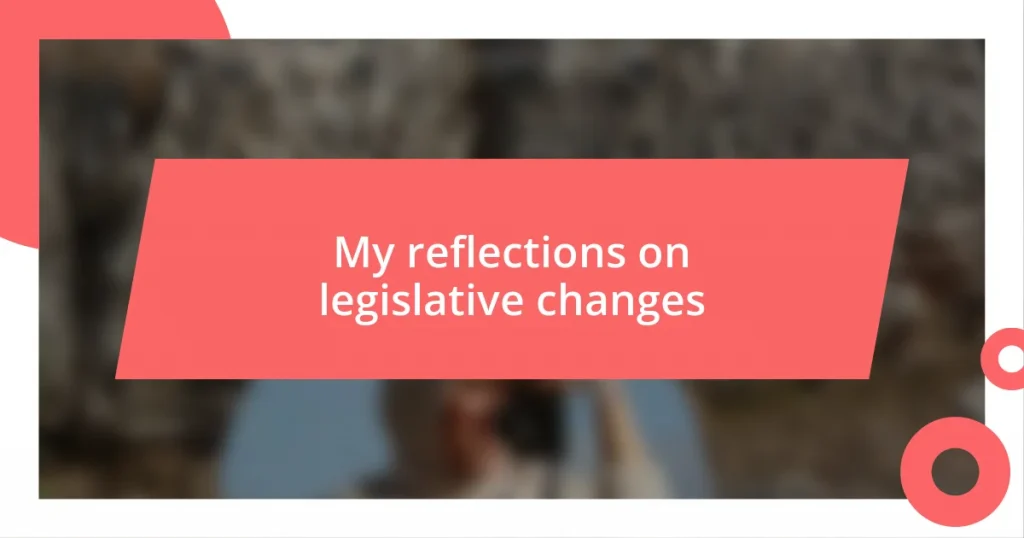Key takeaways:
- Legislative changes reflect societal values, with mixed emotions arising from both positive impacts and unintended consequences, as seen in healthcare reforms and education funding.
- New laws on data privacy and environmental regulations indicate progress but can create economic concerns and community divisions, highlighting the complexity of their effectiveness.
- Engagement and dialogue surrounding legislative changes are vital for their success; community discussions can foster understanding and shape future outcomes.

Introduction to Legislative Changes
Legislative changes can profoundly impact our daily lives, often in ways we do not immediately recognize. I remember when a new environmental law was passed in my city, and I was struck by how it altered everything from the air quality to local business practices. Have you ever considered how these changes ripple through your community?
Each legislative change tells a story about society’s evolving values and priorities. For instance, as new laws often arise from the need to address pressing social issues, I find myself contemplating what these shifts say about us as a collective. It makes me wonder: are we moving towards a more equitable society, or are we just creating laws that serve the interests of a select few?
Throughout my experiences, I’ve seen how legislative changes can feel both empowering and daunting. When a pivotal healthcare reform was enacted, many of my friends celebrated the newfound access to important services, yet others expressed confusion over the complexities of the new system. Isn’t it fascinating how these changes can evoke such a spectrum of emotions?

Overview of Recent Legislative Changes
The landscape of legislation has shifted significantly in recent months, encompassing a range of issues from healthcare to environmental protection. I recall a time when an extensive childcare support program was introduced in my state. My friend, a young mother at the time, felt an immense relief as it eased her financial burdens, allowing her to focus more on her children.
Significant changes have also occurred regarding data privacy and consumer rights, which I find particularly compelling. When a new law passed to enhance data protection for consumers, I couldn’t help but reflect on the fears I had regarding my personal information online. Just a few years ago, I felt overwhelmed by the lack of control I had over my own data, and now this shift seems like a move toward empowerment for individuals.
As these legislative changes unfold, they come with both optimism and apprehension. Much like when my community introduced stricter regulations on waste disposal, I noticed a mixture of enthusiasm for cleaner streets and frustration from local businesses worried about compliance costs. Change often stirs complex emotions, don’t you think?
| Legislative Change | Impact |
|---|---|
| Childcare Support Program | Reduced financial stress for families |
| Data Privacy Law | Increased consumer control over personal data |
| Waste Disposal Regulations | Cleaner environment, higher compliance costs |

Personal Experiences with Legislative Changes
When I think back to the legislative changes around education funding in my district, it really highlights the mixed emotions tied to such reforms. I remember sitting in a parent-teacher meeting when we discussed how the new funding model aimed to provide better resources but also led to rising tensions among staff. On one hand, it was hopeful to envision improved facilities, yet the uncertainty about staff layoffs hung heavily in the air.
- The recent changes in education funding caused debates among parents and educators.
- Improved resources created excitement, but concerns over job security caused unrest.
- It demonstrated just how legislative shifts can lead to competing sentiments, where progress comes hand-in-hand with worry.
Another significant moment for me was when a local initiative aimed at increasing public transportation was passed. I eagerly awaited the new bus routes to be implemented, picturing the positive impact on my commute. However, when the plans rolled out, I faced longer wait times and more crowded buses than before. I couldn’t help but feel torn; while I appreciated the intent behind the change, the immediate reality felt less than ideal.
- Legislative changes in transportation are designed to improve access.
- New routes initially promised more convenience but led to overcrowding.
- This experience showed how the outcomes of well-meaning legislation can sometimes diverge from our expectations.

Analyzing the Effectiveness of Changes
Analyzing the effectiveness of legislative changes often reveals a layered reality that goes beyond surface-level impacts. I remember the buzz surrounding a new workplace safety law that aimed to protect employees in high-risk industries. Initially, there was palpable excitement; however, as the three-month mark approached, many workers began to voice concerns about the lack of training and resources provided to implement these new safety measures. It made me wonder, are we truly prepared for these changes, or are we merely ticking boxes?
In my experiences, the real effectiveness can often be gauged through conversations within the community. After a new health care policy was introduced, I spoke with my neighbor, a nurse, who shared mixed feelings. While the intention to provide better patient care was clear, the reality was that workload increases without adequate staffing led to burnout among staff. This raised a significant question: How can we measure effectiveness if the changes lead to unintended negative consequences for those at the forefront?
Moreover, the anticipation surrounding new educational reforms was something I was eager to discuss with local teachers. There was hope for curriculum enhancements that promised to engage students better. However, when I attended a workshop where teachers expressed their struggles with the additional administrative burden, I couldn’t help but reflect. Are we creating a system that prioritizes creativity and learning, or one that simply adds more pressure to our educators? It’s fascinating to see how legislation can shift perceptions so dramatically, sometimes in ways that contradict the original goals.

Future Implications of Legislative Changes
Reflecting on the potential future implications of legislative changes often brings a sense of trepidation. Recently, I came across a proposal to increase environmental regulations aimed at combating climate change. While I fully support the cause, I found myself pondering about the economic ramifications. Would small businesses bear the brunt of these changes, struggling to keep up with new compliance costs? This is a valid concern that keeps me awake at night.
Moreover, it’s interesting to think about how legislative alterations can redefine community interactions. I recall the discussions surrounding a recent law aimed at enhancing digital privacy. While the intent was to empower individuals, I wondered whether such changes could inadvertently create rifts within communities, with some feeling more secure and others left scrambling to understand their rights. How do we strike a balance between fostering trust in technology and ensuring that no one feels excluded?
Finally, I can’t help but consider the ripple effects of legal reforms on societal attitudes. When a new equity law was passed in my community, it sparked vibrant dialogues about representation and fairness. However, I also noticed a sense of skepticism among some who felt the changes were merely symbolic rather than substantive. It raised a thought-provoking question in my mind: Are we genuinely advancing toward equality, or is this just a momentary shift in conversation that could fade over time?

Conclusion and Final Thoughts
As I reflect on the journey through recent legislative changes, I feel a mix of hope and concern. It strikes me how easily excitement can transform into frustration when the intended outcomes don’t materialize. For instance, I remember feeling invigorated by a new mental health initiative, only to later hear from a friend struggling to access the promised resources. This experience reinforces the idea that passing a law is just the beginning; the real challenge lies in effective implementation.
Looking ahead, I find myself questioning whether these changes will endure or fade into the background. I’ve often mused about a particular environmental policy aimed at reducing carbon footprints. While it’s commendable, I can’t help but wonder, will communities rally behind these initiatives, or will the initial enthusiasm dwindle? These moments of uncertainty illustrate how change affects not only policies but also the people living under them.
Ultimately, engaging with these changes has led me to a profound realization: the impact of legislation often hinges on the conversations we cultivate. I recall a town hall meeting where community members passionately debated a new housing law. It was a vivid reminder that the true essence of legislative change is rooted in the dialogue it sparks. Will we use these opportunities to learn and grow, or allow them to pass without meaningful discourse? The answer, I believe, shapes the future we’re building together.















